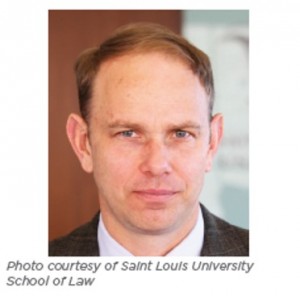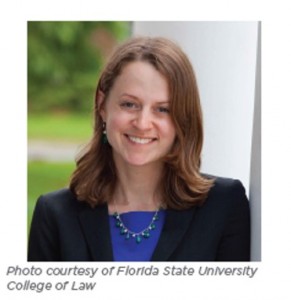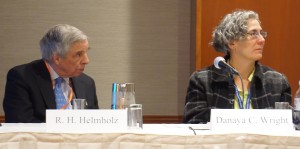Spotlight on Sections: Section on Legal History
By Barbra Elenbaas
AALS Sections provide a forum for law school faculty and staff and to connect on issues of shared interest. Each of the 100 AALS sections is focused on a different academic discipline, affinity group, or administrative area. For a full list of AALS sections and how to join, please visit www.aals.org/services/sections.
The Section on Legal History seeks to foster interdisciplinary scholarship and teaching in the broad field of legal history, promote discussion of ideas relating to teaching and research in the history of all legal systems of the present and the past, and mentor scholars in the rich traditions and disciplines of historical legal studies.

Anders Walker, Saint Louis University School of Law (Chair)

Mary Ziegler, Florida State University College of Law (Chair-Elect)
: The section includes law faculty who teach legal history surveys as well as faculty who have a joint appointment in a law school and history department. We also have members who teach constitutional law and members who write in legal history—including faculty who teach torts, contracts, property—who have an interest in issues that date back to the founding of the country and beyond.
We’re fortunate because we have a professional organization, the American Society for Legal History, which has members including historians who are not law professors. Our AALS section, of all law faculty, plays a support role to the ASLH in many ways. ASLH has an annual meeting, which is well-attended, and that’s where much of the action is in legal history.
The field has an active and centralized blog which includes a running review of recently-published work, new work, calls for papers, and daily business of legal historians. The blog is independently run, and has a large following.
What our AALS section is going to try to do at the 2017 AALS Annual Meeting is highlight some leading figures or ideas that are already on the radar at ASLH. Hopefully, it’s a way to recruit new members, but also to convey that this is an active, robust field where there’s a lot of exciting new scholarship.
What are the important conversations happening right now in the field of legal history?
AW: With the passing of Justice Scalia, certainly the question of originalism is an important conversation. Original intent of the founders of this country—this is a perennial question and it’s often where legal historians are called to provide some insight. The other big one is the history of race—racial segregation, the new “Jim Crow,” mass incarceration, and the crime bill.
There are also discussions of issues that are currently before the courts. Mary’s book,
After Roe: The Lost History of the Abortion Debate, is part of a current discussion about where the court is going in terms of abortion. Questions about the Religious Freedom Restoration Act. The question of diversity in higher education admissions is back in
Fisher v. University of Texas. Those are issues where legal historians can broaden the net so we can have a conversation with folks who are not simply interested in historiographic debates.
How is legal history being used to better understand modern problems and trends?
Mary Ziegler: There’s always been interest in connecting what we know about history to what’s going on now. Some of it can be, in a global sense, what works and what doesn’t. One of the ways that lawyers, judges, or politicians try to differentiate a good from a bad strategy is to look at what’s happened in the past. Historians have done a lot of good work in that vein—Anders included—on the aftermath of
Brown v. Board of Education.
Historians may also explore this tension between clients and lawyers, which is relevant to any practicing lawyer representing an individual, business, or cause. How you can do that without having the client’s goals getting lost in translation?
If you read the Supreme Court’s jurisprudence on gun rights and the Second Amendment, it’s full of history. The outcome was going to be dictated by different readings of history, of what the framers meant and what happened thereafter.
[Legal history] can also shed light on legal strategies related to what’s going on now—for example, in the abortion context, people are working on figuring out where the strategies we’re seeing now are coming from, and what that tells us about the arguments that are unfolding before the U.S. Supreme Court.
How does membership in this section benefit legal history scholars in the academy? How does your section support the scholarship of your members?
AW: One role we can play is networking. Putting people in touch and getting people interested in the community of legal historians. Through the listserv we communicate events that are happening such as calls for papers or the ASLH Annual Meeting.
MZ: Some of it is also just getting legal history out there as a subject that people in other disciplines care about. We have a history with planning our part of the AALS Annual Meeting program and working with other sections, both to increase attendance and to expose people who are not legal historians to the ways in which this kind of work might matter to them, or contribute to their scholarship. There’s been an ongoing effort to make sure that we’re not just connecting more junior scholars with more senior ones, but also that we’re bringing historians into conversation with the broader legal academy.

Panelists present at the Section on Legal History’s 2016 Annual Meeting program on the Magna Carta. L to R: R. H. Helmholz, The University of Chicago, The Law School and Danaya C. Wright, University of Florida Fredric G. Levin College of Law.
: One of the perennial challenges for legal historians is that every new generation brings popular understandings of documents to bear on their meaning. One great example is the U.S. Constitution. We’re in the middle of a presidential race, and some folks want a candidate who will uphold the Constitution, who’s going to return us to our founding principles. What legal historians can do by looking at a document like Magna Carta is question the role, historically, of something like a constitution.
Magna Carta was a contract that King John’s landed barons forced him to sign at sword-point. He had to acquiesce and he had to hand over power. He had to give over rights that he otherwise assumed were his as the absolute divine ruler of England. That’s something that I find myself every year trying to get across to students—that a constitution limits government power. Magna Carta is a great case study because the king is literally dealing with a mutiny. He has to fork over rights because he simply could not put down the rebellion. This was a huge crisis for the English monarchy. This was not a moment that King John celebrated. In fact, he immediately tried to renege on the deal, and that was the beginning of his downfall.
Being able to focus on something like that and reintroducing Magna Carta in a dramatic way—I think all our panels will raise some of these issues. Truth tends to be stranger than fiction sometimes. We try to provide perspective on things that people have assumptions about that might not be grounded in historical fact. That is one of the rewarding aspects of the field, and it’s something we tried to do with the Magna Carta program. It’s celebrated as this founding document but the actual story was a tense state of affairs. It was the beginning of the end for the monarchy in England.
MZ: The panel covered all the different contributions that history makes. There were some discussions of the actual concrete influence the Magna Carta has had on state constitutions, or due process, or jury trials. But also demystifying Magna Carta, and talking about what people say when they talk about it as this lofty thing. There are parallel histories: the history of the idea of it, which we’ve all grown attached to and politicians invoke all the time; then there’s the actual Magna Carta, which may or may not be the same thing.
What programming do you have in the works for the 2017 AALS Annual Meeting?
AW: We’ll be co-sponsoring our program with the Section on Constitutional Law. In 2017 we’re going to focus on the recent book
Vagrant Nation: Police Power, Constitutional Change, and the Making of the 1960s by Risa Goluboff. That will enable us to showcase not only the book but also the fact that she will soon be dean at University of Virginia School of Law and will occupy a prominent position in AALS and in the community of deans across the country. As a legal historian, she’s someone we want to celebrate.
How do your section members interact and collaborate outside of the annual meetings?
AW: The legal history blog, the ASLH, and I’ve enjoyed collaborating with the Executive Committee and the current executive committee of the section while putting together the Annual Meeting program. Otherwise, the main form of collaboration is through the AALS listserv, which we also try to cross reference with the blog. The blog is so dominant in the field that I think a lot of people go straight to that. I don’t want to create redundancies. I think a positive role for the section is to support the legal history blog and the ASLH. Then we can use our section to try to spread the word to the rest of AALS.
MZ: I think often when there’s a lot of activity on the AALS listserv, it’s not so much scholarly output as it is people trying to organize events outside the context of AALS. I’ve seen a lot of conversations of different groups of people getting involved in things that have a lot of overlap. It’s been useful and generative in that way. I see our role as being the bridge between this vibrant legal history community that already exists—and we were already part of—and the bigger law school community that isn’t necessarily aware of it. I don’t see our job as being recreating the wheel on the legal history side. It’s more creating programs and providing information to people who are interested in the legal history community, whether they aren’t historians at all or they’re more junior historians.
What is your vision for the section, this year and in the years to come? What new initiatives, project-based or ongoing, would you like to see as part of the section?
AW: I’d like to see us provide some counterpoint to the current movement in legal education toward experiential learning. There’s been a lot of interest in increasing clinical offerings in law schools to provide students with hands-on practical experience they need to hit the ground running when they graduate. Some argue that courses like legal history don’t have that experiential value. One of my hopes for the section is to remind folks that law schools are intrinsically linked to the mission of larger universities. So long as law schools do function within a university context, there is a place for academics. There is a place for the study of academic subjects, and the section strives to make those subjects relevant and to bring them to bear on current events.
I think keeping a focus on academics is going to be critical for the academy going forward. We’ve been through this before—there was a law school crisis in the 1930s and a lot of law schools at the time felt like they were not sufficiently connected to universities; they were too independent. The larger university populations tended to view law schools as trade schools, not real academic departments. So we fought for decades to be invited to the table of the university as an equal partner in the academic enterprise, the pursuit of truth and pure research. We can’t lose that. Now is no time to abandon the university mission and declare ourselves to be trade schools. If anything, many law schools now are relying on their ties to large universities to bring in students and weather some of these vagaries of the job markets and applicant pool.
MZ: Relatedly, we want to integrate. How does legal history matter now? I think we can be a good venue for explaining to law schools, faculty, students, and the broader legal community that this idea of a dichotomy between the scholarly enterprise of studying history and the practical reality of law is a false dichotomy. I think that message doesn’t always get out, but it’s part of the experience of a lot of legal historians because we’re a relatively new part of the legal academy. Most of us do cultivate a lot of relationships with people who are not primarily historians and are interested in what practical or normative lessons that can be gained from historical study would look like.
It’s important to recognize the value of the academic study of history being part of a university but also to remind people that there’s practical value to studying history. It’s not like we’re all up in the ivory tower ignoring reality to our detriment. That’s a narrative that doesn’t make sense to almost anyone who studies legal history. The section can be a good place to remind people of that.
